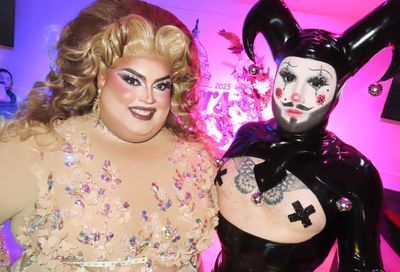Burundi President Calls for Gay People to Be Publicly Stoned
Évariste Ndayishimiye suggested all gay people in Burundi be publicly stoned. "That's what they deserve," he said.

The United States has expressed concern over comments by Burundian President Évariste Ndayishimiye, who recently called on citizens of his country to stone gay people.
Ndayishimiye said that gay people should not be accepted in Burundi, where consensual same-sex intimacy is punishable by up to two years in prison, reports The New York Times.
“I think that if we find these kinds of people in Burundi, it is better to take them to a stadium and stone them. And that cannot be a sin,” Ndayishimiye said during a December 29, 2023, event where he answered questions from journalists and the public. “That’s what they deserve.”
He also railed against Western countries, suggesting that they had made acceptance of foreign aid conditioned upon accepting homosexuality and LGBTQ rights.
“Let them keep it,” he said of the financial support from those countries.
A gay rights activist in Burundi, speaking to the Times on condition of anonymity for fear of retaliation, expressed fears that Ndayishimiye’s statement “worsens an already unsafe environment” by effectively condoning, and some would say, even encouraging, Burundians to engage in extrajudicial killings of LGBTQ people.
According to Reuters, the U.S. State Department expressed concern over the broader implications of the Burundian president’s remarks, but did not specifically address his comments about stoning LGBTQ people.
“The United States is deeply troubled by President Ndayishimiye’s remarks targeting certain vulnerable and marginalized Burundians,” U.S. State Department spokesperson Matthew Miller said in a statement. “We call on all of Burundi’s leaders to respect the inherent dignity and inalienable rights, including equal access to justice, of every member of Burundian society.”
While Ndayishimiye’s remarks don’t have the force of law, they mark yet another escalation of anti-LGBTQ sentiment by officials in a slew of African countries that are seeking to impose harsher penalties for homosexuality.
Those countries, which typically base such policies on Christian or Islamic religious beliefs opposing homosexuality, justify pursuing the restrictive laws by claiming that LGBTQ identity is a Western phenomenon imposed on African nations by foreigners — ignoring the historical fact that it was Western colonizers who imported anti-sodomy laws and imposed them on native Africans in the 1800s.
Recently, Ugandan lawmakers — cheered on by right-wing politicians and religious organizations in the United States — passed the country’s Anti-Homosexuality Act, a sweeping law that imposes lengthy jail sentences for same-sex relations and the death penalty for acts of “aggravated homosexuality.”
Those supporting the law have justified it using the same kind of rhetoric — and propagandistic rationale — that has been used to push through laws restricting the sexual freedom or freedom of expression of LGBTQ-identifying individuals.
The United States has imposed a range of sanctions against Uganda for the law, which it claims violates human rights, including denying travel visas to Ugandans involved with passing and promoting the law, and removing Uganda from a tariff-free trade deal. The World Bank also suspended all future loans to the country in response to the law’s passage.
The law — which has been condemned by many Western nations and global human rights organizations — is also being challenged in the country’s Constitutional Court.
Yet despite the backlash against Uganda, railing against homosexuality, or using LGBTQ people as a scapegoat to deflect from various domestic policy failures or governmental corruption, is particularly en vogue in African nations as of late.
Some lawmakers in Kenya, Ghana, Zambia, South Sudan, and Tanzania have urged their own governments to adopt Ugandan-style laws that would punish people for merely identifying as LGBTQ or “promoting” homosexuality — typically defined as spreading information or sharing depictions of LGBTQ identity that present homosexuality in a positive or facially-neutral light — as well as for engaging same-sex relations.
Support Metro Weekly’s Journalism
These are challenging times for news organizations. And yet it’s crucial we stay active and provide vital resources and information to both our local readers and the world. So won’t you please take a moment and consider supporting Metro Weekly with a membership? For as little as $5 a month, you can help ensure Metro Weekly magazine and MetroWeekly.com remain free, viable resources as we provide the best, most diverse, culturally-resonant LGBTQ coverage in both the D.C. region and around the world. Memberships come with exclusive perks and discounts, your own personal digital delivery of each week’s magazine (and an archive), access to our Member's Lounge when it launches this fall, and exclusive members-only items like Metro Weekly Membership Mugs and Tote Bags! Check out all our membership levels here and please join us today!


























You must be logged in to post a comment.